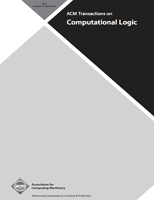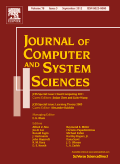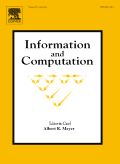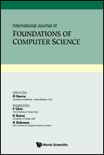
Bulletin of the European Association for Theoretical Computer Science
Scope & Guideline
Pioneering Research in Theoretical Computer Science
Introduction
Aims and Scopes
- Theoretical Foundations of Computer Science:
The journal emphasizes research on the fundamental principles and theories that underpin computer science, including automata theory, formal languages, and computational complexity. - Educational Approaches in Computer Science:
There is a consistent focus on pedagogical strategies and teaching methodologies aimed at improving computer science education, including innovative tools and curricula. - Interdisciplinary Connections:
The journal explores the links between computer science and other disciplines, such as mathematics, logic, and information theory, highlighting the mutual benefits of these relationships. - Community Engagement and Events:
Through reports and articles related to conferences and community activities, the journal fosters engagement within the theoretical computer science community, providing updates on significant events. - Research on Algorithms and Complexity:
A core area of focus includes the study of algorithms, their efficiency, and the complexities involved in computing, which is pivotal for advancing theoretical understanding and practical applications.
Trending and Emerging
- Interdisciplinary Research:
There is an emerging trend towards interdisciplinary research that bridges computer science with other fields such as mathematics, cognitive science, and education, emphasizing the importance of collaborative approaches to problem-solving. - Educational Innovation:
Recent articles highlight innovative educational practices and tools, indicating a growing interest in enhancing computer science education through modern pedagogical techniques and interactive learning environments. - Reversible Computing:
The exploration of reversible computing as a computational model is gaining traction, reflecting a broader interest in energy-efficient computing and the theoretical implications of reversibility in algorithms. - Complexity Theory and Open Problems:
Research addressing open problems in complexity theory is trending, suggesting a renewed focus on foundational challenges that can drive future research directions and applications. - Algorithmic Applications in Real-World Problems:
There is an increasing emphasis on the application of theoretical algorithms to solve practical problems, showcasing the relevance of theoretical computer science in addressing contemporary technological challenges.
Declining or Waning
- Classical Automata Theory:
While automata theory has been a staple of theoretical computer science, there seems to be a waning emphasis on classical results in this area, potentially overshadowed by more applied computational theories and practices. - Descriptive Complexity:
Research related to descriptive complexity appears to have decreased, as newer methodologies and computational models gain traction, suggesting a shift in focus toward more practical applications. - Traditional Formal Language Studies:
The depth of exploration into traditional formal language studies seems to be diminishing, as the community may be favoring broader and more integrative approaches to language theory. - Historical Perspectives on Computer Science:
The journal's focus on historical analyses and retrospectives, while valuable, has become less prominent, indicating a possible shift in interest towards current and future challenges in the field.
Similar Journals

ACM Transactions on Computational Logic
Elevating Standards in Logic and Computer ScienceACM Transactions on Computational Logic, published by the Association for Computing Machinery, is a premier journal dedicated to the advancement of computational logic, spanning the disciplines of computer science and mathematics. With its ISSN 1529-3785 and E-ISSN 1557-945X, this journal has established itself as a vital resource within the academic community, particularly noted for its influential contributions reflected in its 2023 scopus rankings. The journal holds notable quartile rankings, achieving Q1 in the fields of Computer Science (miscellaneous) and Logic, alongside Q2 in Computational Mathematics and Theoretical Computer Science, indicating its prestigious position in the respective categories. Researchers, practitioners, and students can access a wealth of rigorous research articles that delve into both theoretical frameworks and practical applications of computational logic, fostering innovation and collaboration in the field. As it converges towards its 2024 objectives, ACM Transactions on Computational Logic continues to uphold a commitment to excellence and impact, striving to shape the future of computational theories and methodologies.

JOURNAL OF COMPUTER AND SYSTEM SCIENCES
Fostering excellence in theoretical and practical computer science.The Journal of Computer and System Sciences is a distinguished publication founded in 1967 and continually striving to push the boundaries of knowledge in computer science and applied mathematics. Published by Academic Press Inc, Elsevier Science, this journal boasts impressive credentials, holding a Q1 quartile ranking across multiple categories including Applied Mathematics, Computational Theory and Mathematics, Computer Networks and Communications, and Theoretical Computer Science as of 2023. With a focus on innovative research and comprehensive theoretical developments, this journal serves as a pivotal forum for authors and readers alike, facilitating cutting-edge contributions to the field. The journal is not currently open access, providing a curated selection of high-quality articles for its subscription residents. By engaging with this journal, researchers, professionals, and students can gain insight into the latest trends, prominent methodologies, and significant findings that shape the modern landscape of computing and systems analysis.

COMPUTATIONAL COMPLEXITY
Elevating Discourse in Computational MathematicsCOMPUTATIONAL COMPLEXITY is a pivotal peer-reviewed journal published by SPRINGER BASEL AG, dedicated to advancing the field of computational theory and mathematics. Established as a key resource since its inception in 1991, the journal's scope encompasses significant areas including computational complexity, algorithmic processes, and mathematical innovations that shape theoretical computer science. With an impressive history of dissemination and influence, it holds a 2023 category quartile ranking of Q2 and Q3 across various mathematics and computer science disciplines, indicating its substantial contribution to academic discourse. Notably, researchers and practitioners should be aware that while the journal is not an open-access publication, it remains accessible via institutional subscriptions and may include selective open-access options for individual articles. By fostering rigorous scholarly communication, COMPUTATIONAL COMPLEXITY continues to attract a diverse readership of academics, professionals, and students who are keen to explore emerging trends and foundational theories in this dynamic field.

Computer Science Journal of Moldova
Exploring New Frontiers in Computational ExcellenceComputer Science Journal of Moldova, published by the Institute of Mathematics and Computer Science Academy, serves as a pivotal platform for disseminating research in the field of computer science since its inception in 1993. With a focus on a diverse range of subjects, including Artificial Intelligence, Computational Mathematics, and Software Engineering, this open access journal aims to foster innovation and collaboration among researchers, students, and industry professionals. Despite its current positioning in the lower quartiles as per the latest Scopus rankings, the journal remains committed to enhancing the visibility of regional research and addressing contemporary challenges through scholarly contributions. The journal’s open access model ensures that knowledge is freely available, promoting broader readership and impact within the international academic community. As it moves through the converged years from 2019 to 2024, the Computer Science Journal of Moldova continues to aspire toward empowering the next generation of computer scientists while enriching the global dialogue in this rapidly evolving field.

Logical Methods in Computer Science
Advancing the frontiers of logic in computing.Logical Methods in Computer Science is a premier Open Access journal dedicated to fostering scholarly dialogue within the realms of Computer Science and Theoretical Computer Science. Established in 2004 and published by LOGICAL METHODS COMPUTER SCIENCE E V in Germany, this journal aims to bridge theoretical frameworks and practical applications, providing a platform for innovative research and discoveries. With an impressive HIndex reflecting its commitment to high-quality research, Logical Methods in Computer Science has achieved a Q2 ranking in both the miscellaneous and theoretical categories of computer science, indicating its growing influence in the academic community. Researchers, professionals, and students are encouraged to access and engage with the wealth of knowledge this journal offers, which is freely accessible to facilitate widespread dissemination of cutting-edge advancements in logical methods. With its convergence period extending from 2005 to 2024, Logical Methods in Computer Science continues to be a vital resource for those looking to explore the intersections of logic, computation, and mathematics.

DISCRETE MATHEMATICS AND THEORETICAL COMPUTER SCIENCE
Advancing Knowledge at the Intersection of Mathematics and ComputingDISCRETE MATHEMATICS AND THEORETICAL COMPUTER SCIENCE, published by DISCRETE MATHEMATICS THEORETICAL COMPUTER SCIENCE in France, stands as a significant open-access journal since 1997, publishing innovative research articles within the intersecting disciplines of discrete mathematics and theoretical computer science. With an ISSN of 1462-7264 and an E-ISSN of 1365-8050, this journal aims to provide a platform for scholarly discourse and dissemination of knowledge, making it accessible to a global audience. It is recognized for its contributions, achieving a Q2 ranking in both Computer Science (Miscellaneous) and Discrete Mathematics and Combinatorics, alongside a Q3 ranking in Theoretical Computer Science as of 2023. The journal’s rigorous selection process ensures that only high-quality research is published, promoting advancements in these critical areas of study. Researchers, professionals, and students alike can benefit from its comprehensive articles that not only enhance theoretical understanding but also foster practical applications in the ever-evolving landscape of computer science.

INFORMATION AND COMPUTATION
Fostering Scholarly Excellence in Information and ComputationINFORMATION AND COMPUTATION is a peer-reviewed academic journal published by Academic Press Inc., Elsevier Science, dedicated to advancing the fields of computational theory and mathematics, computer science applications, and information systems. With an ISSN of 0890-5401 and an E-ISSN of 1090-2651, the journal provides a platform for innovative research that spans theoretical and applied perspectives. Acknowledged for its impact in the community, it holds a Q2 quartile ranking in several categories, including Computational Theory and Mathematics and Computer Science Applications, as of 2023. These rankings place it among the leading journals in its field, making it an essential resource for researchers, professionals, and students aiming to stay abreast of cutting-edge developments. While it does not currently offer Open Access options, the journal intends to foster scholarly communication and knowledge sharing from its inception in 1987 to its future issues expected through 2024. Located in the United States, at 525 B ST, STE 1900, SAN DIEGO, CA 92101-4495, INFORMATION AND COMPUTATION is committed to publishing high-quality research that influences the theoretical foundations and practical applications of its diverse disciplines.

INTERNATIONAL JOURNAL OF FOUNDATIONS OF COMPUTER SCIENCE
Pioneering Research in Computer Science FoundationsThe International Journal of Foundations of Computer Science, published by World Scientific Publishing Co Pte Ltd, is a premier repository for cutting-edge research in the field of computer science, emphasizing foundational theories and methodologies. With an ISSN of 0129-0541 and an E-ISSN of 1793-6373, this journal has established itself as a valuable resource since its inception in 2000, continuously contributing to scholarly discourse up to the present year, 2024. It is ranked in the Q2 quartile of computer science categories, indicating its notable impact and relevance within the academic community, particularly in miscellaneous subsections of the field. While it does not currently offer open access options, it remains a crucial platform for researchers, professionals, and students seeking to deepen their understanding of computational foundations, algorithms, and theoretical frameworks. The journal encourages submissions that push the boundaries of knowledge and invites innovative approaches that address contemporary challenges in computer science.

Theory of Computing
Pioneering Research in Computational TheoryTheory of Computing, published by the University of Chicago, Department of Computer Science, is a prestigious journal that has established itself as a leading platform in the fields of Computational Theory and Theoretical Computer Science. With its ISSN 1557-2862, the journal has earned a reputation for high-quality, peer-reviewed research, positioning itself in the Q1 quartile for both Computational Theory and Mathematics, as well as Theoretical Computer Science as of 2023. Despite its limited open access options, the journal remains a vital resource for researchers and academics, providing insights that push the boundaries of theoretical frameworks and methodologies in computer science. The journal's commitment to rigorous scholarship serves to foster innovation and deepen understanding in a rapidly evolving field, making it an essential reference for professionals, students, and practitioners alike.

Computability-The Journal of the Association CiE
Exploring the Intersection of Theory and ApplicationComputability - The Journal of the Association CiE, published by IOS PRESS, is a premier academic journal dedicated to advancing the field of computational theory and its applications. Established in 2012, this journal serves a diverse audience, including researchers, professionals, and students involved in the realms of Artificial Intelligence, Computational Theory and Mathematics, and Theoretical Computer Science. With robust categorization in Q2 and Q3 quartiles for various related fields, it provides a vital platform for innovative research and discussions that shape the landscape of computational technologies. Although it operates under a subscription model, the quality of published content ensures significant academic contributions and offers valuable insights relevant to contemporary scientific challenges. Researchers interested in the intersection of computation and its practical implications will find Computability an essential resource for exploring cutting-edge developments and fostering scholarly exchange.